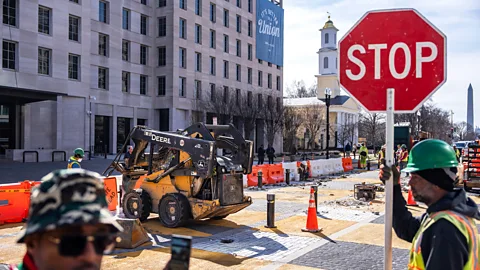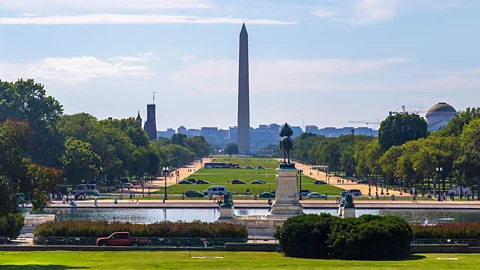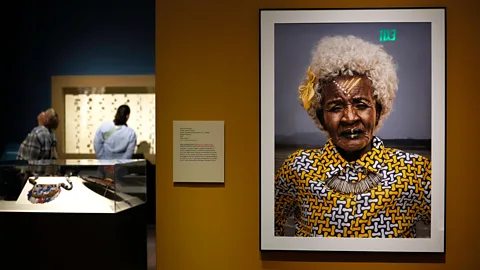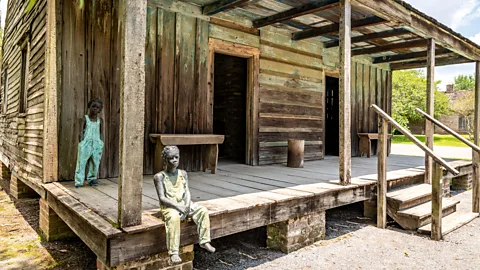Which US will tourists find when they visit?
 Getty Images
Getty ImagesRecent changes by the Trump administration are affecting how US museums and institutions tell the nation's multicultural history to travellers.
In the last few months, US President Donald Trump has threatened to annex Canada; warned that the US will "go as far as we have to go" to seize Greenland; and imposed tariffs on all nations, effectively initiating a global trade war. But while many of Trump's most dramatic "America first" actions are aimed at other countries, his sweeping new policy changes are also affecting how the US tells its own multicultural story.
Several highly touristed landmarks in the US are already facing significant changes.
On 27 March, Trump signed an executive order titled Restoring Truth and Sanity to American History, arguing that there has been "a concerted and widespread effort to rewrite our Nation's history, replacing objective facts with a distorted narrative driven by ideology rather than truth". The order took specific aim at the Smithsonian Institution, whose 21 museums, 21 libraries and many other research and cultural centres comprise the world's largest museum complex and were visited by nearly 17 million people in 2024.
"Once widely respected as a symbol of American excellence and a global icon of cultural achievement," the order states, "the Smithsonian Institution has, in recent years, come under the influence of divisive, race-centred ideology."
The order threatens to bar congressional funds from institutions that espouse "improper, divisive or anti-American" beliefs. As an example of this, Trump cited programming from the Smithsonian's National Museum of African American History & Culture, the only national museum devoted exclusively to documenting African American life, history and culture from slavery to the modern era.
Headquartered on the National Mall in Washington DC, some of the Smithsonian's many museums focus on marginalised communities in the US – including the National Museum of the American Indian,the National Museum of African Art, the National Museum of the American Latino and the embattled National Museum of African American History and Culture.
Many activists and historians have expressed outrage over the order's broader meaning and argued that it is actually a brazen attempt to do what Trump is denouncing: rewrite US history. This begs the question, which version of the US will visitors find?
"It seems like we're headed in the direction where there's even an attempt to deny that the institution of slavery even existed, or that Jim Crow laws and segregation and racial violence against Black communities, Black families, Black individuals even occurred," said Dr Clarissa Myrick-Harris White, a historian and Africana studies professor at the historically Black Morehouse College in a statement to the Associated Press.
 Alamy
AlamyThis concern was echoed by the American Historical Association, whose 10,000 members represent the world's largest organisation of professional historians. In a statement co-signed by 31 organisations, the association says the executive order "egregiously misrepresents the work of the Smithsonian Institution", which was established by Congress more than 175 years ago for the "increase and diffusion of knowledge".
"The stories that have shaped our past include not only elements that make us proud but also aspects that make us acutely aware of tragedies in our nation's history," the statement notes. "No person, no nation, is perfect, and we should all – as individuals and as nations – learn from our imperfections."
Some feel Trump's targeting of the Smithsonian is part of a broader culture war he has been waging against "woke ideology" across many of the nation's federally run institutions. Since returning to office, Trump has worked to dismantle the Institute of Museum and Library Sciences, which oversaw grant funding for numerous Native American, Native Hawaiian, Latinx and African American museums across the country; and Trump's agencies have reportedly issued a list of words to limit or disappear from government websites, like "women", "Black" and "cultural heritage".
Some of these references have already been removed from websites or displays of traveller-friendly landmarks. In February, Stonewall National Monument in New York City, which is run by the US National Park Service, erased references to transgender people. In March, Arlington National Cemetery in Virginia – which is managed by the US Department of the Army – scrubbed its website of any information highlighting the contributions of African American, Hispanic or female servicemembers, including removing stories about veteran and civil rights leader Medgar Evers and the Tuskegee Airmen, the US's first Black Airforce pilots. In nearby Washington DC, a two-block section of 16th Street leading to the White House with the words "Black Lives Matter" was recently repaved in response to threats to cut transportation funding if the plaza was not renamed.
 Getty Images
Getty Images"If you take a broad brush and say we've spent too much time talking about folks other than old white [men], then you have wiped out a lot of what actually makes America great," said Greg Werkheiser, founding partner of Cultural Heritage Partners, a law firm that specialises in protecting cultural heritage sites. "A lot of places around the world have had similar challenges and have not overcome them. We have. And those lessons are not lessons of self-loathing and tragedy, they're lessons about how we keep pushing towards a more perfect union."
Since the Black Lives Matter protests five years ago, many museums and other cultural institutions have sought to include more diverse perspectives in their exhibitions, a move that often boosted their visitor numbers. But as Werkheiser explained, the Trump administration's unprecedented exertion of influence on cultural institutions is especially problematic for those that specialise in telling stories from Black, Asian, Latinx and LGBTQ+ perspectives, since many of these places rely on federal funding to keep them afloat.
"That baseline of commitment [from the government] is essential to ensure that the ebbs and flows of private donors don't take out institutions. When we take that away, we make these institutions very unstable."
Visitors to the US may now find that even larger museums and organisations have been forced to make sweeping changes to their programming in light of the new policies. The DC-based Art Museum of the Americas cancelled two planned exhibitions highlighting the work of Black and LGBTQ+ artists in March, reportedly in response to the administration's new diversity, equity and inclusion (DEI) policies. Meanwhile, the United States Marine Band, the country's oldest continually active musical association, recently cancelled a concert that was supposed to feature young musicians of colour. Perhaps most famously, in February Trump seized control of the Kennedy Center in Washington DC, one of the US's premier arts institutions. Since Trump's takeover, a host of acts have cancelled their planned appearances in protest.
 Alamy
Alamy"If it didn't matter, they wouldn't try to stop us," said Ashley Rogers, executive director of the Whitney Plantation, the only plantation museum in Louisiana focussing exclusively on the experience of the people who were forcibly enslaved there. "These stories that we've been telling, they explain us to ourselves. You cannot understand the United States today without understanding our history with regard to race, slavery, relationships with Indigenous people and the genocides – all of these things that are 'bad'. We have to understand them, because they explain who we are today."
Where to visit:
Here are three museums, that Werkheiser and the staff of Cultural Heritage Partners feel help to tell the story of US history, and could use visitor support.
• Museum of the Cherokee People
(Cherokee, NC) – One of the oldest tribally operated museums in the country, the museum's mission is "to preserve and perpetuate the history, culture and stories of the Cherokee people".
• Black History Museum and Cultural Center of Virginia
(Richmond, VA) – Housed in the historic Leigh Street Armory, the institution highlights the history, culture and contributions of African Americans from Virginia, from civil rights heroes to Nascar's first Black race car driver.
• National Museum of Women in the Arts
(Washington DC) – From the 17th-Century work of Mary Beale to the modern rhinestone-encrusted portraits by Mickalene Thomas, this museum tells little-known stories of women in the arts.
The Whitney and other nearby locations, including a centuries-old sugar-cane plantation that once housed Africans and Creole people recently lost a bid to be designated as a National Historic Landmark District, a process that had been in the works for several years. The designation would have protected the Whitney and other historical sites from outside development, a necessary move as many in the local area had long wanted to clear the path for more industrial development, according to Rogers. She added that local government officials requested to have the application pulled from consideration once the Trump administration got in office.
Both Rogers and Werkheiser expressed concern that the budget cuts Trump is imposing on cultural institutions might have long-term repercussions. They stressed that even if funding cuts and DEI restrictions are ultimately overturned in court, they may still trigger a long-lasting drop in the financial stability of smaller institutions – especially those that seek to tell stories from diverse perspectives, which may not attract as many visitors as larger, more "mainstream" museums. Historians, scholars, artists and others employed by cultural institutions who carry this specialised knowledge are also at risk.
"These artefacts and the sites that represent our shared history, are vulnerable to destruction and to permanent loss, but I'm also worried that the people who preserve those histories are also irreplaceable," said Werkheiser. "I'm very concerned about the scholars and government employees who have devoted their careers to preserving our country's cultural heritage. Many have lost their jobs or worried that they might soon be out of work, and we know that their knowledge and expertise are vital."
Rogers and Werkheiser stressed the importance of institutions and individuals pushing back against these policies as much as possible. They also highlighted the role of visitors in helping to support cultural institutions that tell stories from diverse perspectives, particularly in difficult times.
"What's happening at [the] Whitney, the way that this administration's policies are affecting us, that is happening in everyone's local community," said Rogers. "There is going to be a local museum, a local library [near you] who is really struggling, and they need our support more than ever right now."
--
If you liked this story, sign up for The Essential List newsletter – a handpicked selection of features, videos and can't-miss news, delivered to your inbox twice a week.
